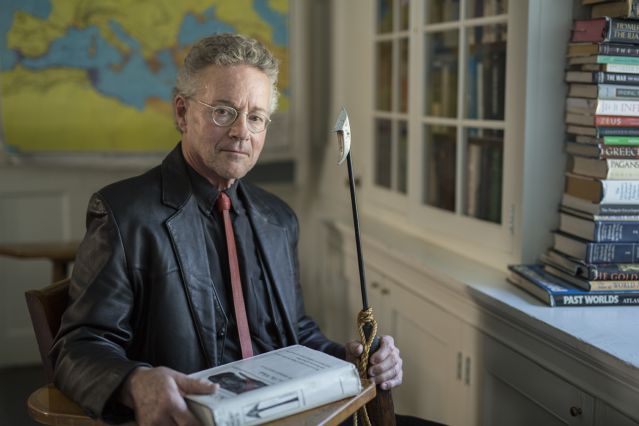Gratitude
What Makes an Extraordinary Teacher?
We know it when we see it, but do we let them know we see it?
Posted June 18, 2015
I recently returned from the most rewarding speaking engagement of my career. I had the privilege of speaking at the retirement of my high school English teacher, Thomas McGraw.
“Coach” McGraw taught and coached at Phillips Academy, Andover for 32 years, and quickly became “one of the most storied men to grace this campus,” as Jordan Swett, class of 2015, described him in an address to students and faculty.

As we may intuitively grasp, “… the most important factor affecting student learning is the teacher,”[i] researchers at the University of Tennessee conclude. Eleanor Duckworth, Research Professor at the Harvard Graduate School of Education, describes the best teaching as “getting people to think about what they think, and asking them questions about it.”[ii] English teacher Renee Moore maintains, “Good English teachers have a good relationship with their students. Not only do they teach the students, but they talk to the students about things other than the things that are supposed to be taught. Good teachers take time out and speak to students like they are friends.”[iii]
This is not only exemplary of the transformative power of a great teacher, but the extraordinary leadership a great teacher provides. And it perfectly describes Tom McGraw’s teaching style.
A Vietnam-era veteran, Tom dedicated his life to service—first by answering the call to serve in the Army, and then by becoming a teacher. Ask his former students what made him legendary, and just as was the case in his classes, there is no one right answer. He is described as a mentor, a visionary, a friend, and to many alumni, a hero.
“He taught me what courageous means,” remembers one of his first students.
“He gave me a love of writing,” recounts another.
“We had to write ‘Wednesday Paragraphs,’” a former student recalls. “Some of us worked on our big writing projects and turned in pieces every week. And some of us just wrote diary entries. He always returned our Wednesday Paragraphs with more writing from him than what was in the paragraphs!” He wrote back to us with focus, intensity and purpose. He asked us to question everything.
“I played football,” a former athlete reminisces. “One day at practice, I choked. I couldn’t throw a spiral. I was struggling with some personal issues then, and to not be able to throw was just the icing on the cake. I didn’t know what to do. I actually had the thought that I would never play football again. Coach saw right away that something was wrong and said, ‘let’s take a walk.’ He started telling me about his own childhood and what it was like for him to grow up without a father. And as we walked, he casually tossed the ball to me and I tossed it back. Pretty soon, I opened up. I poured my heart out. And we just stood there talking and tossing the ball back & forth. Without me noticing, he was backing up little by little and before I knew it, I had thrown a spiral. Just like that. I had my spiral back. I’ll never forget that. He saved me. And he never needed to say anything about it.”
Whether we were his students or his athletes, what was clear to each of us was that he loved us. And he listened.
An ability to see someone else’s perspective provides something very special. But an ability to see from someone else’s perspective is truly extraordinary. This was one of Tom's many gifts to his students. He completely “grokked” us. And somehow that gave us permission to see differently and to stretch ourselves to be bigger people than we knew ourselves to be—to do things that were beyond what we knew ourselves to be capable of.
Even when we have extraordinary teachers who have made a difference in our lives, we don’t always sustain our relationships with them after we graduate. (Certainly in the days before Facebook, many of us did not). We move on, and our teachers miss seeing the long-term results of their work.

Psychologist Martin Seligman devised an exercise he calls “The Gratitude Visit.” Undertaking this exercise with former teachers is one way to show them how much they mean to us.
Here is how it works: Write a letter of gratitude to a teacher who had a positive impact on you. Seligman suggests that the letter be about three hundred words, and that you be specific; what did your teacher do for you and how did your teacher affect your life? Describe your life now and mention how often you think about your teacher.
“Make it sing!” he exhorts. After your letter is written, call your teacher and tell him or her that you’d like to visit, but be vague about the reason. “…this exercise is much more fun when it’s a surprise,” Seligman counsels. When you visit, read your letter aloud from start to finish. (If an in-person visit is out of the question, you can do this on the phone or use video calling technology.) After reading your letter, have a conversation. According to Seligman, you will be happier as a result.
And you just might make a difference in the life of a teacher. ♦

This is the value of the teacher, who looks at a face and says there's something behind that and I want to reach that person, I want to influence that person, I want to encourage that person, I want to enrich, I want to call out that person who is behind that face, behind that color, behind that language, behind that tradition, behind that culture.
—Maya Angelou
References
[i] Wright, S. P., Horn, S. P., & Sanders, W. L. (1997). Teacher and classroom context effects on student achievement: Implications for teacher evaluation. Journal of Personnel Evaluation in Education, 11, 57–67, p. 63.
[ii] NPR Ed, Five Great Teachers on What Makes a Great Teacher


